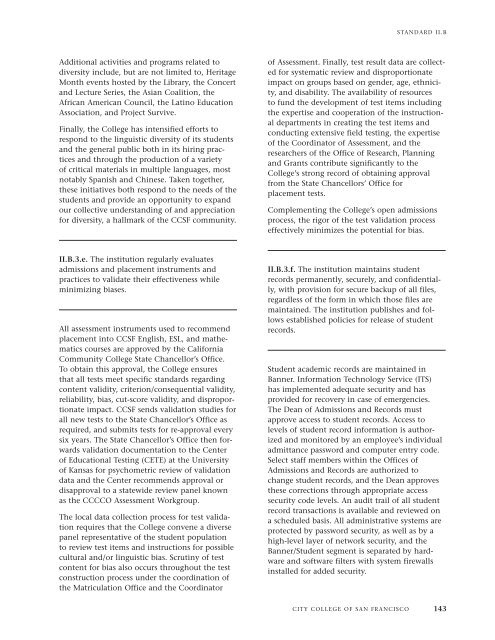City College of San Francisco - California Competes
City College of San Francisco - California Competes
City College of San Francisco - California Competes
Create successful ePaper yourself
Turn your PDF publications into a flip-book with our unique Google optimized e-Paper software.
STANDARD II.B<br />
Additional activities and programs related to<br />
diversity include, but are not limited to, Heritage<br />
Month events hosted by the Library, the Concert<br />
and Lecture Series, the Asian Coalition, the<br />
African American Council, the Latino Education<br />
Association, and Project Survive.<br />
Finally, the <strong>College</strong> has intensified efforts to<br />
respond to the linguistic diversity <strong>of</strong> its students<br />
and the general public both in its hiring practices<br />
and through the production <strong>of</strong> a variety<br />
<strong>of</strong> critical materials in multiple languages, most<br />
notably Spanish and Chinese. Taken together,<br />
these initiatives both respond to the needs <strong>of</strong> the<br />
students and provide an opportunity to expand<br />
our collective understanding <strong>of</strong> and appreciation<br />
for diversity, a hallmark <strong>of</strong> the CCSF community.<br />
<strong>of</strong> Assessment. Finally, test result data are collected<br />
for systematic review and disproportionate<br />
impact on groups based on gender, age, ethnicity,<br />
and disability. The availability <strong>of</strong> resources<br />
to fund the development <strong>of</strong> test items including<br />
the expertise and cooperation <strong>of</strong> the instructional<br />
departments in creating the test items and<br />
conducting extensive field testing, the expertise<br />
<strong>of</strong> the Coordinator <strong>of</strong> Assessment, and the<br />
researchers <strong>of</strong> the Office <strong>of</strong> Research, Planning<br />
and Grants contribute significantly to the<br />
<strong>College</strong>’s strong record <strong>of</strong> obtaining approval<br />
from the State Chancellors’ Office for<br />
placement tests.<br />
Complementing the <strong>College</strong>’s open admissions<br />
process, the rigor <strong>of</strong> the test validation process<br />
effectively minimizes the potential for bias.<br />
II.B.3.e. The institution regularly evaluates<br />
admissions and placement instruments and<br />
practices to validate their effectiveness while<br />
minimizing biases.<br />
All assessment instruments used to recommend<br />
placement into CCSF English, ESL, and mathematics<br />
courses are approved by the <strong>California</strong><br />
Community <strong>College</strong> State Chancellor’s Office.<br />
To obtain this approval, the <strong>College</strong> ensures<br />
that all tests meet specific standards regarding<br />
content validity, criterion/consequential validity,<br />
reliability, bias, cut-score validity, and disproportionate<br />
impact. CCSF sends validation studies for<br />
all new tests to the State Chancellor’s Office as<br />
required, and submits tests for re-approval every<br />
six years. The State Chancellor’s Office then forwards<br />
validation documentation to the Center<br />
<strong>of</strong> Educational Testing (CETE) at the University<br />
<strong>of</strong> Kansas for psychometric review <strong>of</strong> validation<br />
data and the Center recommends approval or<br />
disapproval to a statewide review panel known<br />
as the CCCCO Assessment Workgroup.<br />
The local data collection process for test validation<br />
requires that the <strong>College</strong> convene a diverse<br />
panel representative <strong>of</strong> the student population<br />
to review test items and instructions for possible<br />
cultural and/or linguistic bias. Scrutiny <strong>of</strong> test<br />
content for bias also occurs throughout the test<br />
construction process under the coordination <strong>of</strong><br />
the Matriculation Office and the Coordinator<br />
II.B.3.f. The institution maintains student<br />
records permanently, securely, and confidentially,<br />
with provision for secure backup <strong>of</strong> all files,<br />
regardless <strong>of</strong> the form in which those files are<br />
maintained. The institution publishes and follows<br />
established policies for release <strong>of</strong> student<br />
records.<br />
Student academic records are maintained in<br />
Banner. Information Technology Service (ITS)<br />
has implemented adequate security and has<br />
provided for recovery in case <strong>of</strong> emergencies.<br />
The Dean <strong>of</strong> Admissions and Records must<br />
approve access to student records. Access to<br />
levels <strong>of</strong> student record information is authorized<br />
and monitored by an employee’s individual<br />
admittance password and computer entry code.<br />
Select staff members within the Offices <strong>of</strong><br />
Admissions and Records are authorized to<br />
change student records, and the Dean approves<br />
these corrections through appropriate access<br />
security code levels. An audit trail <strong>of</strong> all student<br />
record transactions is available and reviewed on<br />
a scheduled basis. All administrative systems are<br />
protected by password security, as well as by a<br />
high-level layer <strong>of</strong> network security, and the<br />
Banner/Student segment is separated by hardware<br />
and s<strong>of</strong>tware filters with system firewalls<br />
installed for added security.<br />
CITY COLLEGE OF SAN FRANCISCO<br />
143







